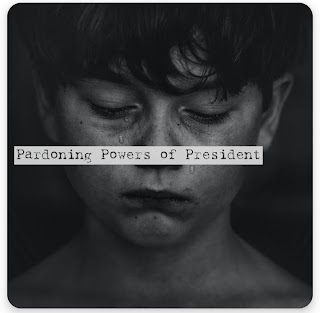Introduction:
- The Constitution of India conferred the power on the President of India and the Governors of the States by Articles 72 and 161 respectively.
- A pardon is an act of mercy, forgiveness, and clemency.
- The concept of pardon is an artefact of older times, of an age where an omnipotent monarch possessed the power to punish or remit any punishment.
- In India, the power to pardon is a part of the Constitutional scheme.
- The Power of pardon exists to prevent injustice, whether from harsh, unjust laws or from judgments which result in injustice; hence the necessity of vesting that power in an authority other than the judiciary has always been recognised.
When can the President use his Pardoning Powers?
The President can use any one of the pardoning powers in the cases mentioned below:
- When he is considering a case of punishment against a person who has committed an offence against a Union Law
- When he is considering a case of punishment where the latter is given by the court-martial or military court
- When he is considering a death sentence.
What are the Pardoning Powers of the President?
As mentioned above, there are five types of Pardoning Powers of the President. Read about each below in the table:
| Types of Pardoning Powers of the President | ||
| S.No. | Type | Detail |
| 1. | Pardon | When the President pardons, both the sentence and the conviction of the convict completely absolve the sentences, punishments and disqualifications |
| 2. | Respite | When the President uses the pardoning power of ‘Respite’, he chooses to award a lesser sentence in place of one originally awarded to the convict. For example, due to some special fact, such as the physical disability of a convict or the pregnancy of a woman offender, the President can use this power |
| 3. | Reprieve | When the President chooses the pardoning power of ‘Reprieve’; he stays the execution of a sentence (especially that of death) for a temporary period. By doing this, he enables the convict to have time to seek pardon or commutation from him |
| 4. | Remit | When the President chooses the pardoning power of Remit, he acts to reduce the period of the sentence but the character of the sentence remains the same. For example, a sentence of rigorous imprisonment for two years may be remitted to rigorous imprisonment for one year but the imprisonment remains rigorous |
| 5. | Commute | When the President chooses to use this pardoning power of ‘Commute; he substitutes one form of punishment for a lighter form. For example, a death sentence may be commuted to rigorous imprisonment, which in turn may be commuted to simple imprisonment. |

Comments
Post a Comment